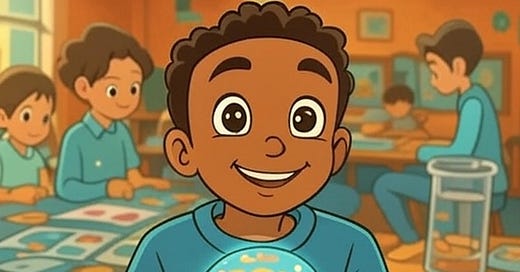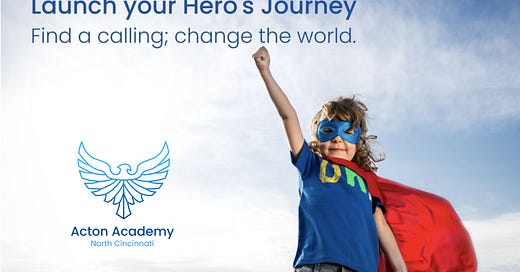
Ambiguity in the Learning Environment
How Acton Academy's Learner Driven education supports real-life experiences (1,066 words)
Given that it’s a week after the USA’s presidential election and we’re in the “lame duck” phase of American presidential governance, I imagine that most Americans are feeling some level of uncertainty about the future.
To honor where we are, let’s step back, look at the world from a higher perspective, and talk about ambiguity at Acton Academy.
Ambiguity is woven into the fabric of Acton Academy’s learner-driven approach to education.
Acton Academy co-founder, Laura Sandefer, wrote about ambiguity in her blog article, “Ambiguity as Teacher: Part 1 of 2” way back in 2018, saying,
“... I didn’t know the road to discovering my potential was the Hero’s Journey as I sat straight up in desks and made the adult authorities around me very proud with my right answers and good behavior.
I want more for my children. I want them to navigate the inevitable uncertainty in their world with confidence, skill, bravery and joy.
We had to use ambiguity as a teacher and tool at Acton because ambiguity increases complexity, and makes decision-making more difficult.”
Laura Sandefer
Unlike traditional schools where every lesson is prescribed and learning outcomes are tied to report cards that only measure specific types of intelligence, and where success is defined by achievement on standardized tests, Acton Academies thrive on a culture of open-ended exploration, where skills stack and learning develops an ever-deepening relevance to life, helping learners develop confidence based on real personal agency.
With that kind of an outcome, why wouldn’t children at Acton Academy learn to love learning?
At Acton, ambiguity is not something to be avoided; it’s a tool deliberately employed to empower learners and help them build resilience, self-direction, self-awareness, curiosity, and a real growth-mindset – someday I’ll tell you the story about the hourlong presentation to a 6th grade class by the head teacher of a local district’s history department in their brand new $130 million building, proving that money doesn’t buy a quality education, but that’s for another post.
What Kind of Person do you want your child To Be when they’re 18?
In traditional assembly-line schools – public, private, classical, charter, parochial, etc – adult roles are active and children/learners’ roles are passive. In traditional school settings, learning is something an adult does to a child. No wonder we have a society of adults today who feel lost, confused, and disempowered.
At Acton, it’s the opposite.
Within the structure of a daily schedule that leaves room for individualized core skills and group projects that are based on solving real-world problems, children learn to compare themselves to humanity’s heroes instead of their classroom’s peers. Children learn to expect excellence, demand mastery, and embrace ambiguity, proving that Acton Academy heroes are not just capable of handling uncertainty—they learn to thrive within it.
Ambiguity on Purpose
At Acton Academy, the learning environment is often purposefully vague, with projects designed to have multiple solutions rather than a single “correct” answer. This ambiguity requires students to think critically, collaborate, and adapt as they encounter different challenges and perspectives.
Take, for instance, a project on entrepreneurship where learners may be tasked with creating a product or service (invite your 6-14 year old to join the Waitlist for our Children’s Business Fair!). There are no exact instructions nor a predefined set of steps. Students must figure out everything from ideation to execution, encountering obstacles and even failure (bringing the opportunity for reinvention) along the way. This experience mimics real-world challenges, where answers are rarely clear-cut, and success often depends on one’s ability to remain calm, seek creative solutions, and persist.
Don’t those seem like useful character traits for living in the world these days?
Ambiguity and a Growth Mindset
Ambiguity also helps learners develop a growth mindset – the belief that intelligence and abilities can be developed through effort. When faced with ambiguous tasks, students learn that mistakes are not setbacks or “opportunities” to define someone as a failure, but steps in the learning process. The lack of prescribed answers encourages children to take ownership of their learning and find paths forward independently.
For example, instead of looking to a teacher to solve a problem, children turn to their own reasoning. They learn to use their brain, look in a book, and ask a buddy, before they come to a guide/teacher, which builds confidence, camaraderie (including the ability to take and give coaching from their peers), and problem-solving skills. This kind of learning sticks with them because they’ve achieved it themselves, through resilience and reflection, rather than by regurgitating a scripted answer based on someone else’s deadlines and objectives.
Trust the Learners
This trust is tested in everyday interactions. Facilitators or Guides, for example, are trained not to answer questions directly. If a student asks for help, guides will often respond with a question of their own: “How could you find the answer?” or “What have you tried so far?” This approach reinforces the belief that learners have the tools within themselves to reach the answers.
From the background mindset of an industrial checklist system (as virtually all of us adults have), trust in the learner’s ability to find their way even when the path isn’t clear requires a leap of faith.
Trusting the learners means accepting that the journey itself is as valuable as the outcome. It’s understanding that ambiguity can lead to discovery, that struggling is a powerful teacher, and that independence is built by navigating uncertainty.
At Acton, trusting the learners is a foundational and non-negotiable value; it reflects a deep respect for each child’s capacity to grow and learn in ways that are uniquely their own. This trust in ambiguity, based on the belief that learners can and will rise to meet challenges in their own time and in their own way, empowers students to take ownership of their education, preparing them for a world that’s as dynamic and uncertain as the learning environment they are supported to thrive in each day.
That’s all for now. Reply to this email with any questions, or comment directly on this post to share your thoughts.
Talk soon,
PS — here’s a real story about ambiguity with a personal reflection, written by an Acton parent, called “Trusting the Little Humans”, that attends Acton Academy Oshkosh.
Joshua Blatman
ActonCincyNorth.com
TheDrivenLearner.com











